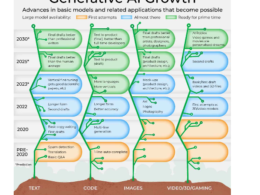the health strategist
knowledge platform
Joaquim Cardoso MSc.
Chief Research and Strategy Officer (CRSO)
Chief Editor and Senior Advisor
August 11, 2023
What is the message?
A lawsuit against Cigna signals a significant legal challenge regarding the use of AI in claims denial, potentially impacting numerous health plan members.
As the case unfolds, it could shape discussions surrounding the role of AI in healthcare decision-making and its potential consequences.
Executive Summary:
Background
- A recent lawsuit alleges that Cigna, a prominent health insurance provider, employs artificial intelligence (AI) algorithms to improperly deny numerous claims, sidestepping legal requirements for individual claim assessments.
- This practice purportedly leads to denials for medically necessary treatments, putting the burden of payment on patients.
Lawsuit Details
- Cigna members Suzanne Kisting-Leung and Ayesha Smiley have filed a complaint in California’s eastern district court, accusing Cigna of violating state insurance regulations by failing to perform “thorough, fair, and objective” claim reviews.
- Instead, the company allegedly relies on an AI algorithm called PxDx to quickly deny claims, allowing doctors to dismiss cases without reviewing patient files. The average processing time for claims is stated to be just 1.2 seconds.
Cigna’s Response
- Cigna has asserted that it uses technology, including AI, to streamline the verification of coding for standard, cost-effective procedures and to expedite reimbursement for physicians. The company has labeled the lawsuit as “highly questionable.”
AI Concerns and Broader Implications
- The case highlights growing concerns about the increasing role of AI in healthcare and other sectors, raising questions about its potential to replace human decision-making.
- The law firm Clarkson, representing the plaintiffs, has previously taken legal action against major tech companies over data usage for AI training.
Impacted Claimants and Allegations
- The lawsuit alleges that Cigna denied medically necessary tests to the plaintiffs, such as bloodwork for vitamin D deficiency screening and ultrasounds for potential ovarian cancer patients.
- Appeals by the plaintiffs were reportedly unsuccessful, leading to out-of-pocket payments.
Class Action and Legal Implications
- Clarkson is pursuing a jury trial and aims to have the lawsuit certified as a federal class action.
- This designation could potentially allow other Cigna health plan members in California, totaling two million individuals, to join the lawsuit. Legal experts suggest that Cigna may contest the class size in court.
Expert Opinion
- I. Glenn Cohen, a legal expert from Harvard Law School, views this lawsuit as a novel case involving AI-based claim denial.
- He believes that if the case proceeds as a class action, pressure on Cigna to settle could intensify.
Previous Allegations and Industry Trends
- This lawsuit follows earlier instances of alleged misconduct by Cigna, including claims of intentional underpayment of medical claims and accusations of conspiring to inflate prescription drug prices.
- Such allegations underscore ongoing concerns within the healthcare industry.
Mentioned names:
Steph Weber (freelance journalist specializing in healthcare and law)
I. Glenn Cohen (legal expert from Harvard Law School)
Suzanne Kisting-Leung (Cigna member)
Ayesha Smiley (Cigna member)
This is an Executive Summary of the article “Cigna Accused of Using AI, Not Doctors, to Deny Claims: Lawsuit”, published by Medscape. To read the original article, access https://www.medscape.com/viewarticle/995193?src=FYE&form=fpf








